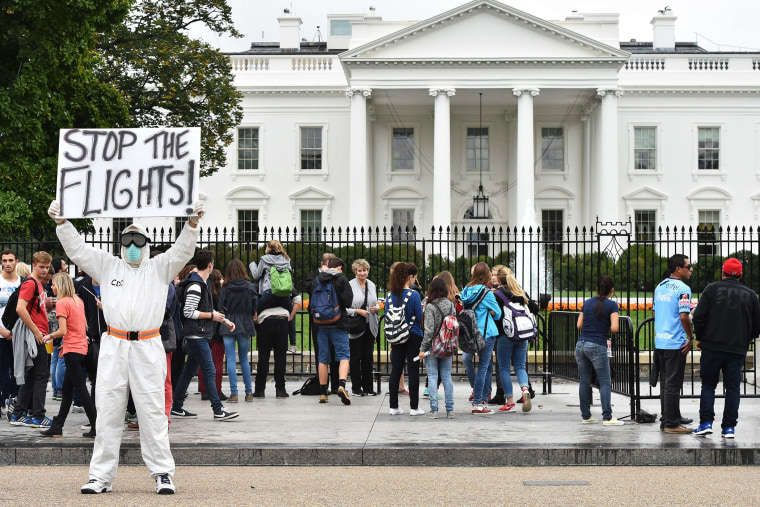Never let facts get in the way of a good panic. Although there have been just three confirmed cases of Ebola in the United States -- at least one of which appears to have been caused more by negligence than anything else -- the great American Ebola hysteria of 2014 is now in full swing. And people with large megaphones are doing their best to ensure it continues indefinitely.
Perhaps the greatest source of unnecessary terror is Capitol Hill. For months, members of Congress have been insisting that immigrants threaten to carry Ebola across American borders and infect citizens. On Thursday, shortly before a House hearing on the U.S. government's response to the Ebola crisis, a number of Republican members of Congress insisted that the government institute new travel restrictions to stem the tide.
Center for Disease Control (CDC) director Thomas Frieden told the House on Thursday that his agency has not entirely ruled out travel restrictions, although for now the administration has no plans to implement one. Frieden's position has long been that any travel restrictions would make it harder for medical supplies and personnel to reach the parts of Africa afflicted by the Ebola epidemic, thereby prolonging the crisis.
Not everyone's stopping at rhetoric about travel restrictions. Sen. Rand Paul, (R-Ky.), recently wondered aloud about the possibility of a "worldwide pandemic." On Wednesday, a journalist at that website called on the Pentagon to carry out a military coup against President Obama and then implement a travel ban.
On Fox News Radio, psychiatrist and Fox News contributor Keith Ablow theorized on Wednesday that President Obama didn't want to institute a travel ban and prevent Ebola from reaching American shores because he believes that "we [Americans] are bad people." Later that day, former Fox News host Glenn Beck appeared on the network's The O'Reilly Factor and implied that the president is deliberately ignoring a burgeoning Ebola emergency in Dallas, Texas because of the city's conservative political leanings.
"This is happening in Dallas, Texas. This is a top ten city in the United States of America. Happens to be one that doesn't particularly care for the president all that much, and his policies," said Beck. "One that the president has not been too favorable on. We're already being squeezed on our southern border. Now we're getting squeezed by Ebola. Is there an agenda here?"
All the dire warnings seem to be having an effect. Last week, the Reason-Rupe public opinion research project released a poll finding that 62% of Americans believe an Ebola outbreak in a U.S. city is at least "somewhat likely." Tea Party supporters were the group of Americans most likely to hold that belief: A full 73% of them agreed, compared to 69% of Republicans as a whole and 58% of Democrats.
The panic has even reached some school administrations. A Texan community college initially rejected at least two Nigerian applicants because, according to one of its rejection letters, it "is not accepting international students from countries with confirmed Ebola cases." Schools in both Ohio and Texas have closed down due to Ebola scares.
None of which may stem the spread of the disease, but the increasingly fearful rhetoric may serve a different purpose. A growing body of psychological research suggests that, in the words of NYU psychologist John Jost, "[t]hreatening situations do indeed seem to increase people's affinity for politically conservative opinions, leaders, and parties." With two weeks left till the 2014 midterm elections, a solid dose of Ebola panic might bolster the fortunes of the Republican ticket.
